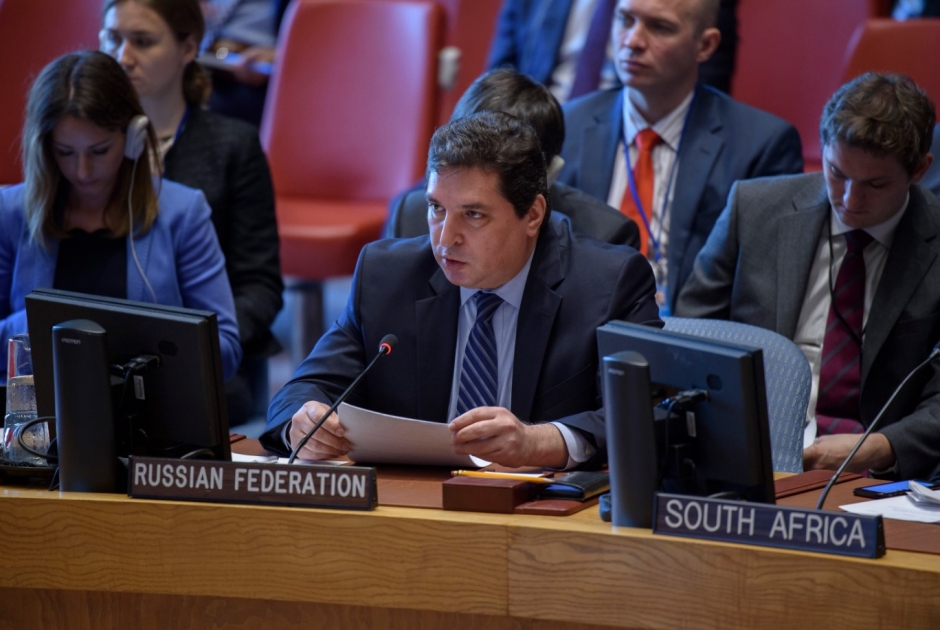Statement by Deputy Permanent Representative Vladimir Safronkov at the UN Security Council Meeting on Yemen
Mr. President,
At the outset let me thank today’s briefers for an in-depth review of the military, political and humanitarian situation in Yemen.
Russia and Yemen are bound by many decades of traditionally friendly relations that are inspired by mutual respect and multi-faceted ties in many domains. What is happening in Yemen echoes with pain in Russia.
We have to say that the situation in Yemen remains tragic. Despite the efforts taken both within the UN and via bilateral channels – the implementation of the Stockholm Agreements is stalled, including redeployment of armed forces in Hodeidah, and prisoner exchange and de-escalation in Taiz. The opposing sides shift responsibility to each other. This should be stopped. We call upon the Yemenis to abandon unilateral steps that run counter to the Security Council decisions, undermine the prospects of a full-fledged political process, and complicate mediator efforts within the UN framework. We expect implementation of the first phase of redeployment.
There is fragile ceasefire that remains in Hodeidah. However, we are concerned by the intensifying military action in other regions of Yemen. Growing tension impedes the redeployment efforts. All the parties to the Yemeni conflict should abstain from aggressive rhetoric and show restraint.
The behavior of the sides should be defined by the principle “state above all” rather than by their specific interests.
Let me emphasize that progress in Hodeidah is possible. It is possible to start discussing framework modalities of the settlement – the thing Mr. Griffiths is now working on. The international community has called to collectively support his efforts.
Coordinated activities of all the stakeholders will make it possible to foster other aspects of the Stockholm Agreements. Attempts to marginalize one of the parties are counter-productive. We have to bear in mind that the package that was developed and endorsed in Sweden is a unique opportunity to break the vicious circle of Yemen’s tragedy.
We highly assess dedication and professionalism of Martin Griffiths, Michael Lollesgaard and our colleagues on the humanitarian track as they drive the sides in Yemen at implementing the Stockholm Agreements. Russia in its national capacity will be further assisting UN mediator activities in Yemen. We will interact with regional and international partners and engage our contacts with all sides in Yemen. In order to be a success, the UN mediation should rest on assistance rendered by the parties to conflict and be both regional and international.
We hope that together we will be able to persuade all sides that there is no military solution to the conflict in Yemen. We believe that deployment of the United Nations Mission to support the Hodeidah Agreement will add to the disengagement of conflicting forces and help stabilize the situation in the country at large.
Mr. President,
The people of Yemen desperately needs peace. We call upon all sides to de-escalate the situation. Everyone should immediately put aside their contradictions, start cooperating with the UN and ease the humanitarian disaster in the country that Mr. Lowcock talked about today. The majority of the population starves and needs assistance. The country is again on the brink of a cholera epidemic. Children suffer first, as Ms. Gamba has said. We all should proceed from the assumption that even if the conflict is terminated in the near future, the population of Yemen will long remain dependent on external help. The civil and economic infrastructure is ruined, and the cost of its restoration is growing day-by-day.
We call upon the donor community to realize how deeply rooted this problem is and to respond to the urge of the UN humanitarian coordinator. Emergency humanitarian assistance to Yemen is a priority.
Like many other UN Member States, including Yemen’s neighbors, Russia continuously contributes to assisting the Yemeni population.
Another important issue: humanitarian aid that comes to Yemen from abroad should be distributed on a non-discriminatory basis among the entire population in all the regions of the country, no matter who controls this or that particular area. This is how Russia does it.
We underscore, that it is imperative to observe provisions of the international law and to ensure unimpeded access of humanitarian personnel. Indiscriminate use of force, including strikes against civil facilities is absolutely unacceptable.
Mr. President,
Even though humanitarian assistance to Yemen is of utmost importance, the response to the Yemeni challenges should lie in the realm of sustainable and all-encompassing political settlement. It is in this framework that violence should end, new functional ruling bodies should emerge, army should be restored, and economic activities should revive. A crucial issue for Yemen is countering terrorism that tries to make use of the current state of chaos.
We would like to emphasize that establishment of a political process would contribute to stabilization in the entire sub-region. The launch of confidence-building measures in the Persian Gulf – and prospectively in the entire Middle East – in line with the initiative Russia had proposed would help resolve crisis situations, including the conflict in Yemen.
We repeatedly call upon our friends in the region to give a positive response to the Russian proposal and request the international community to support the efforts on this track. Threats and confrontation should give way to dialogue and cooperation where all the States of the region will be part of, including the Gulf countries and Iran. We should promptly sanitate the working environment and make it favorable for us to focus on conflict settlement under the UN auspices.
We once again remind of Security Council resolution 598 that tasked the Secretary-General to cooperate with the States of the region and develop a security architecture. All the circumstances ask for this work to start.
Thank you.
